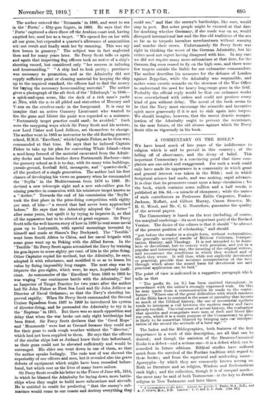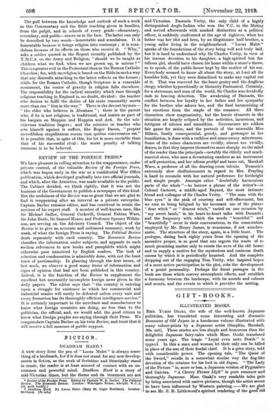A COMMENTARY ON THE BIBLE.*
WE have heard much of late years of the indifference to religion which is said to prevail in this country ; of the
falling off of observance, and the decay of belief. This important Commentary is a convincing proof that these complaints are one-sided and exaggerated. For such a work could only have made its appearance in a community in which great
and general interest was taken in the Bible ; and in which Scriptural science had made, and was making, rapid advance. It is clear that its promoters count upon a large circulation ; for the book, which contains some million and a half words, is published at 10s. 6d.—a miracle of cheapness ; while the names of such contributors as Professors Estlin Carpenter, Foakes
Jackson, Moffatt, and Gilbert Murray, Canon Streeter, Mr. H. G. Wood, and Mr. C. G. Monteflore, guarantee the quality of the several papers.
The Commentary is based on the text (including, of course, the marginal renderings—its most important part) of the Revised Version. The desire of the editors is that it should " be abreast. of the present position of scholarship," and should
"put before the reader in a simple form, without technicalities. the generally accepted results of Biblical Criticism, Interpretation, History, and Theology. It is not intended to be homiletic or devotional, but to convey with precision, and yet in a popular and interesting way, the meaning of the original writers, and reconstruct the conditions in which they worked and of which they wrote. It will thus, while not explicitly devotional or practical, provide that accurate interpretation of the text through which alone the sound basis for devotional use and practical application can be laid."
The point of view is indicated in a suggestive paragraph which tells us that " The prefix St. (or S.) has been omitted throughout, in accordance with the editor's strongly expressed wish. On this he may quote from a communication he made to the contributors : ' Where one of the great difficulties with which teachers of the Bible have to contend is the sense of unreality that invests so much of the Biblical history, the use of reverential epithets tends to interpose a veil between the modern reader and faces already too dim. The vital sense of actual history, the realisation that apostles and evangelists were men of flesh and blood like our own, which it is a main purpose of the Commentary to give, is likely to be somewhat blunted by bringing into our interpretation of the record the attitude of a later age.' "
The Index and the Bibliographies, both features of the first importance in a work of this description, are all that can be desired ; and though the omission of the Deutero-Canonical Books is a defect—and a serious one—it is a defect which can be remedied in future editions. Biblical studies have suffered much from the survival of the Puritan tradition with regard to these books ; and from the equivocal and misleading nameApoorypha—by which they are commonly known among us.
Both as literature and as religion, Wisdom and Ecelesiasticus
rank high ; and the collection, though it is of unequal merit— the same may be said of both Testaments—is the key to Jewish religion in New Testament and later times. The gulf between the knowledge and outlook of such a work as this Commentary and the Bible teaching given in families, from the pulpit, and in schools of every grade—elementary, secondary, and public—stares us in the face. The latter can only be described by two words—lamentable and scandalous. It is lamentable because it brings religion into contempt ; it is scandalous because of its effects on those who receive it. " Why," asks a soldier quoted in the Report recently published by the Y.M.C.A. on the Army and Religion, " should we be taught as children what we find, when we are grown up, is untrue ? " This is a greater evil in the Protestant than in the Roman Catholic Churches ; for, with us, religion is based on the Bible in such a way that any discredit attaching to the latter reflects on the former ; while, for the Roman Catholic, though Scripture is a venerable monument, the centre of gravity in religion falls elsewhere. The responsibility for the radical unreality which runs through religious teaching in England is, no doubt, divided : the teacher who desires to fulfil the duties of his state reasonably meets more than one " lion in the way." There is the devout layman" tho elder who believes in Abraham " ; there is the parent who, if he is not religious, is traditional, and insists as part of his bargain on Muppim and Huppim and Ard. So the mischievous tradition lingers ; and the minister or teacher who sets himself against it suffers, like Roger Bacon, " propter incredibilem stupiditatem eorum cum quibus conversatus eat." It is possible that, in spite of this, his lot is more enviable than that of his successful rival : the worst penalty of talking nonsense is to be believed.







































 Previous page
Previous page